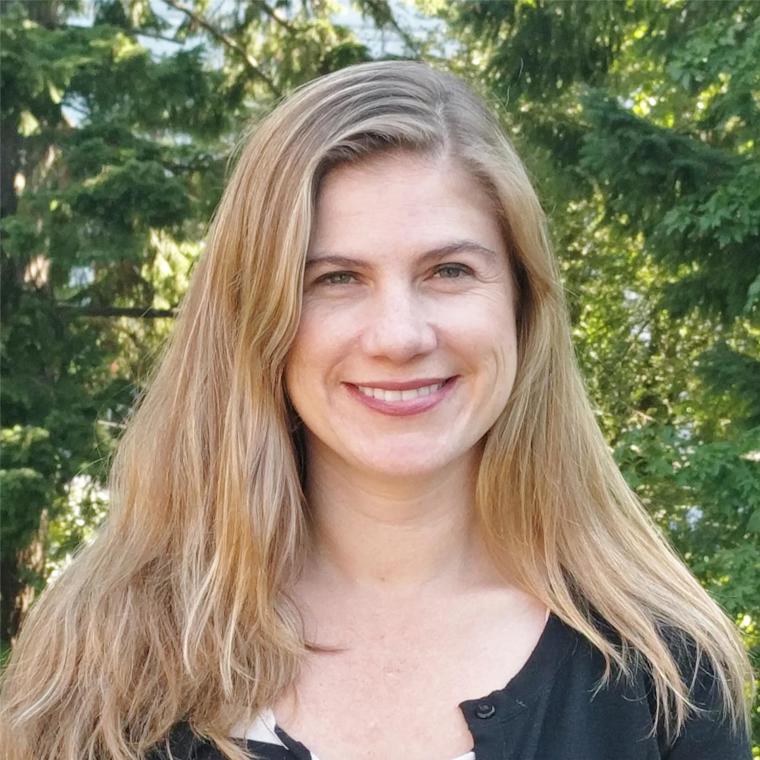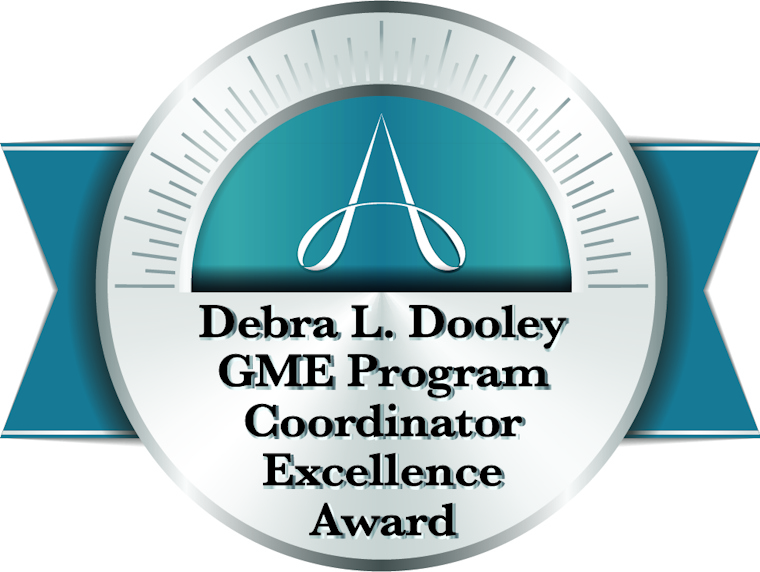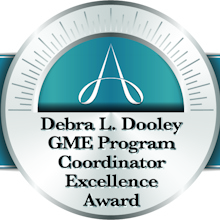This interview is one in a series of interviews with recipients of the 2021 ACGME Awards. The awardees join an outstanding group of previous honorees whose work and contributions to graduate medical education (GME) represent the best in the field. They were honored at the ACGME Annual Educational Conference, which took place virtually February 24-26, 2021.
2021 Debra L. Dooley GME Program Coordinator Excellence Awardee Jodi Leonard works as an education manager in pediatric residency at Oregon Health & Science University in Portland, Oregon.
ACGME: How did you become involved in academic medicine?
Jodi Leonard: I was feeling bored with my general administrative duties. My manager at the time wanted to give me work that I could take more ownership over (thanks, Michelle!), and asked me to be the point person for the cardiology fellowship program. I had no idea at the time that medical education was a possible career, let alone the place that I would find so much joy and fulfillment for the next 20 plus years!
From the start, I found myself surrounded by some of the most inspiring, motivated, and humble people I’d ever met, and wanted to help each trainee reach their desired destination. I was touched by their heartfelt hard work and dedication. Being a small part of their journey created unique and unexpected bonds that I will forever treasure (too many to name, but you all have warmed my heart and know that I’m forever cheering for you!!). In addition, I’ve been blessed with amazing, generous program directors and faculty (thank you OHSU pediatrics for all of the opportunities and support). To pull out just a few - Drs. Reller, Burch, Law, Armsby, Gilhooly, Ferrell, Phillipi, Braner, Aylor and our fellowship directors) who have encouraged me to seek opportunities, sit at any table even if I found myself the only coordinator there, and who always valued my thoughts and ideas. Finally, I’ve had supportive, forward-thinking managers and colleagues (thanks Sue, Christine, Carlie, Susan, Allison, Michelle, Thomas, Reka, Janna, Kristen, Trevor, Krista, Laurie, Kristina, Mike, Sarah, Charlene, Pam and so many more) who have encouraged me to take on innovative projects, be involved with interesting committees and collaborate broadly both locally and nationally.
Once I started working in medical education, I found endless avenues for growth. My journey has taken me from a Divisional Fellowship Coordinator to a Lead/Central Fellowship Coordinator for seven programs, followed by adding supervision responsibilities as the Education Manager overseeing our Clerkship Coordinator, before finding my home as the Pediatric Residency Program Manager, where I have been for the past four years. Needless to say, I haven’t been bored with my job a day since.
ACGME: What does this award mean to you?
Leonard: I was completely speechless when I received the news that I had won this honor. There are so many program coordinators who put their whole heart into their programs, going above and beyond in every way day after day. I see this at my own institution on a daily basis and am continually inspired and awed by the work of my national pediatric colleagues through APPD and beyond. To be pulled from such an outstanding pool of caring, dynamic human beings is beyond humbling.
I have so much respect for the ACGME organization and mission, as it has been the source of truth and focus of all my work-life efforts for the past many years. To be recognized by this group in particular is the highest honor. I remember preparing for my very first site visit and all the nerves I had when I approached my manager to request to attend my first ACGME conference. I hadn’t known anyone at my level to attend at that point. I’d barely gotten my request out before I was told “Absolutely!! Go learn!” (thanks, Thomas!!). To reflect on the path that I’ve taken and the generous support I’ve been blessed with is a gift.
It has also been wonderful to share this award with my family and friends who have spent countless hours listening to me decompress about daily hurdles big and small, while celebrating victories and defeats along the way (thanks, Mom, Tara, Rebecca, Sara, Hayley, Lilly, and the whole Leonard crew to just name a few). My husband’s support provided the security that our family and home were cared for and safe, which enabled me to travel for conferences and work until a project was complete. Working from home this past year allowed me to discover that my children Alex, 13, and Tyler, 10, are truly amazing office-mates. They are now the ones there in the moment for the highs and lows of work life. When I came down the stairs in shock and told them that I had just been recognized for this amazing award, they jumped out of their chairs with such sincere congratulations, and ran to give me hugs like any good officemate would. To share that moment – that was special.
ACGME: What is the most rewarding part of being a coordinator?
Leonard: The people, for sure. I couldn’t handle all the demands and curve balls of this job if it weren’t for the support around me. The genuine goodwill and collaboration at every level in medical education with the common goal of helping us all move forward together is constantly at play, and creates a desire to do more and be a contributing part of the whole. I would do anything for my faculty and programs. I can’t quite explain the excitement and joy of running into past graduates, and learning what they are up to and how big their kids have grown. To think that I have made someone’s path a little easier and maybe helped contribute in some fashion to the amazing things that our grads go off to do is the most fulfilling feeling in the world.
In addition, as I’ve mentioned, this job never gets old. There is always something new to try, areas to explore, changes to implement, and year after year new trainees bring fresh energy while others move on, leaving their unique footprint on our program.
ACGME: What is the most challenging part of being a coordinator?
Leonard: The amount of work and personal investment to programs and trainees can be overwhelming in this field. In addition, the never-ending academic year cycles have little to no “down time” anymore. Big changes can happen very quickly (hello new virtual everything in a matter of months!!). Exploring multiple options, deciding what is best for your group, and then actually making it happen is not easy. But it helps to know that you are never alone. There is always someone in the wings ready to jump in and help if they can. Witnessing all programs come together and share so openly and inclusively makes the challenging parts rewarding and victorious.
ACGME: What advice do you have to brand-new coordinators who are just starting their careers?
Leonard: Don’t box yourself in by definitions or an occasional “no.” When you are given a “no,” try to understand why and open yourself up to other options. If you believe in something strongly, don’t be afraid to revisit conversations again over time as long it is done respectfully. It once took me three to four years before a sufficient compromise was agreed upon to make the institutional change that I felt was important.
Also, keep an ongoing list of your accomplishments and projects you’ve worked on, preferably on an up-to-date “master” resume. New opportunities sometimes have short lead time, and it is helpful to have a complete list of what you’ve done at your fingertips to pull from. In addition, I’ve found it helpful to revisit that document at least yearly to make sure that I am consistently adding new professional development experiences and challenging myself in some way. HR development courses within my institution have helped fill gaps with minimal time and monetary commitment. Think outside the box on how you can apply general classes to your work. Seek the knowledge that you want. Don’t be afraid to ask to help with research projects and presentations. Learning about grants and the National Institutes of Health, QI projects, diversity, and professionalism are all a part of our job in some way. Figure out how you can best apply what interests you and then present a clear plan of how you will get there to your leadership. Even if it’s a “no” the first time, perhaps they’ll think of you next time something comes up.
ACGME: Is there anything else you would like to add?
Leonard: Thank you for the opportunity to share my story, my passion, my gratitude, and my tribe. I know that a lot of time and energy goes into each nomination by people who already have too much on their plate and I don’t take their effort and thoughtfulness lightly. Medical education and pediatrics is a very special field of work and I couldn’t be happier that I ended up where I did. Thank you for the opportunity to revisit my journey and for this wonderful recognition.




